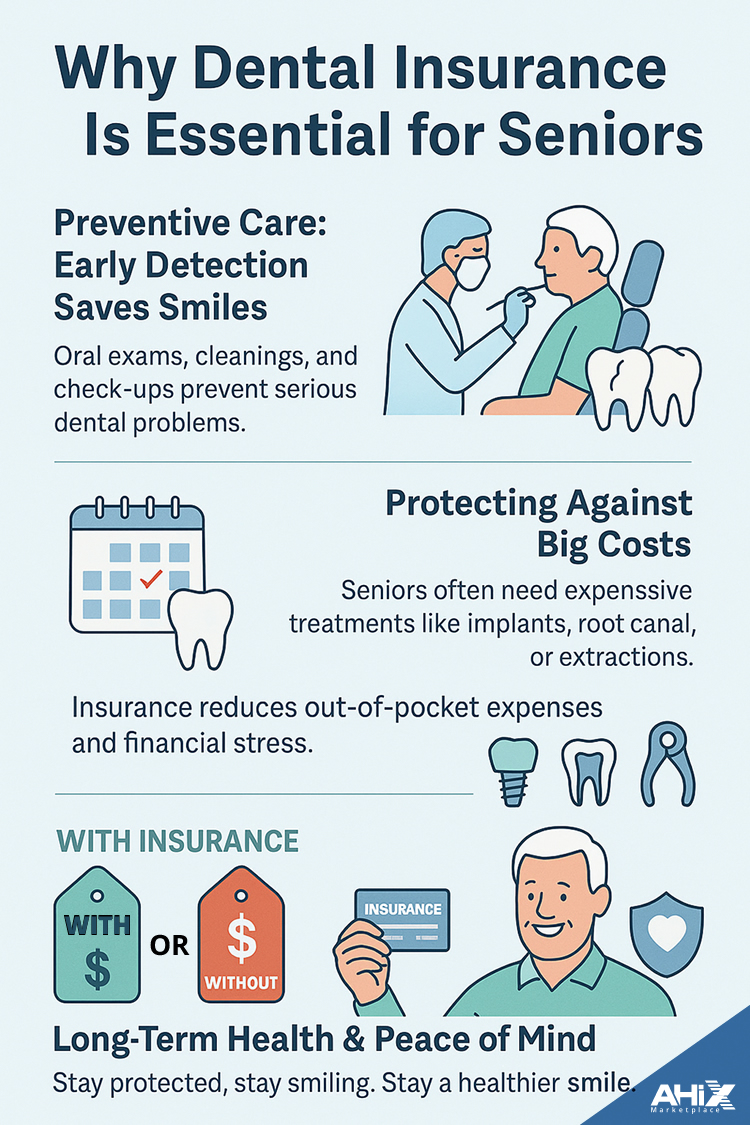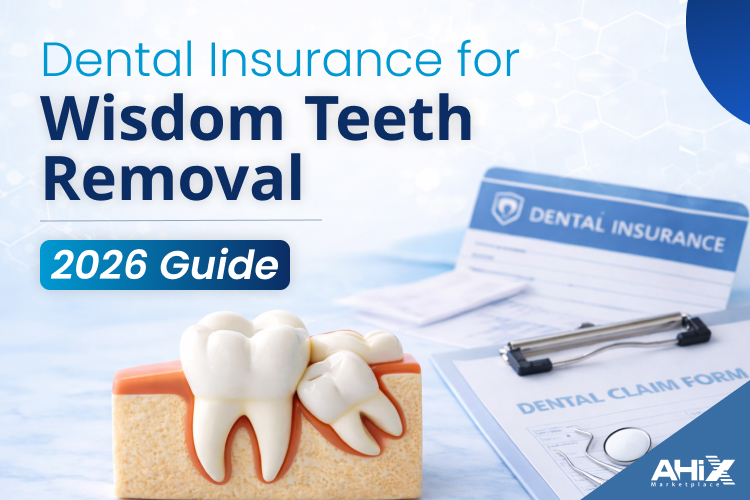Looking for the best dental insurance for seniors on Medicare? This guide breaks down the top plans available in 2025, comparing coverage, costs, benefits, and availability. Discover which options provide the best value and ensure your dental health needs are met. For personalized advice and to understand the specifics of each plan, it is recommended to consult with an insurance agent from AHiX.
Key Takeaways
- Medicare Advantage plans offer better dental coverage for seniors compared to Original Medicare, as approximately 97% of these plans include some form of dental services. These plans often include an extensive network of dental providers, making it easier for seniors to find a dentist who accepts their insurance.
- Top carriers like UnitedHealthcare, Cigna, Aetna, Humana, and Devoted Health are recommended for seniors, offering plans tailored to meet their dental needs with varying coverage limits and benefits.
- Understanding the costs involved, including premiums, out-of-pocket expenses, and network offerings, is crucial for seniors when selecting a dental insurance plan to ensure affordability and adequate coverage.
Understanding Dental Insurance for Seniors
Dental insurance for seniors is a specialized type of insurance designed to help cover the costs of dental care and services, which are crucial for maintaining good oral hygiene and overall health. As we age, our dental needs often increase, making it essential to have a dental insurance plan that covers a wide range of treatments and procedures. These can include routine cleanings, fillings, extractions, and major procedures like root canals and dental implants.
Since Original Medicare doesn’t cover most dental services, many seniors look to alternative options to fill this gap. Whether through a Medicare Advantage plan with built-in dental benefits or a separate dental policy, having the right coverage can make dental care more affordable and accessible.
In the sections ahead, we’ll explore the different types of dental plans available and how to choose the one that best fits your needs.
Affordable Dental Insurance Providers for Seniors with Medicare Advantage

Choosing the right Medicare Advantage plan can make a significant difference in your dental care experience. If you’re looking for comprehensive dental coverage, some of the top picks for seniors over 65 include UnitedHealthcare, Cigna, Aetna, Humana, and Devoted Health. Each of these providers offers a range of plans that cater specifically to the dental needs of seniors, with varying coverage limits and benefits.
UnitedHealthcare stands out with its extensive network, encompassing over a million providers and high coverage limits. Humana’s plans, available in most U.S. counties, offer excellent accessibility, making them a convenient choice for many seniors. Cigna and Devoted Health are also strong contenders, covering most services, including preventive and comprehensive dental care. Reviewing the Evidence of Coverage for each plan helps you understand the specifics of what services are covered and any benefit limits.
Dental coverage is essential for maintaining oral health, particularly for seniors who are more prone to dental issues. Regular check-ups and preventive care can help detect problems early, reducing the need for costly treatments later. Selecting a plan that offers comprehensive dental benefits, including coverage for basic procedures, ensures you receive the necessary care without the burden of high out-of-pocket costs.
Comparing Medicare Advantage vs. Original Medicare for Dental Services
| Aspect | Medicare Advantage Plans | Original Medicare |
| Dental Coverage | Approximately 97% of plans include dental services, covering routine cleanings to complex procedures like dentures and root canals | Does not provide dental benefits; separate insurance or out-of-pocket payments required. |
| Cost-Effectiveness | More comprehensive and cost-effective solution for maintaining oral health | Can lead to higher overall costs due to inadequate coverage for dental services. |
| Plan Features | Offers extensive coverage through Medicare Advantage HMO and Medicare plans | Lacks dental coverage, necessitating supplemental plans for comprehensive care. |
| Preventive Care | Covers 100% of preventive care costs, essential for maintaining dental health | Preventive dental care is not covered, leading to potential financial burden. |
| Network of Providers | Includes a broad network, such as UnitedHealthcare’s extensive dental network | No network for dental services, requiring separate arrangements. |
| Supplemental Insurance Needs | Often unnecessary due to comprehensive coverage within the plan | Requires supplemental dental insurance to bridge gaps in coverage. |
Medicare Advantage plans offer a more comprehensive dental coverage solution compared to Original Medicare, making them a preferred choice for seniors seeking to maintain their oral health effectively.
How Much Does Dental Insurance Cost for Seniors on Medicare?
For seniors on Medicare, understanding the costs associated with dental insurance is essential. Dental insurance plans for seniors typically have a monthly premium ranging from $20 to $50. In addition to premiums, most plans also have an annual maximum benefit, commonly around $1,000. These costs can vary significantly based on the specific plan and the level of coverage it offers, making dental insurance worth considering carefully.
While the premiums and annual maximums are important, seniors should also consider out-of-pocket costs. These can include copays, coinsurance, and expenses for out-of-network services. Understanding these costs can help seniors choose a plan that fits their budget and provides the necessary coverage for their dental needs.
Premiums and Deductibles
Dental insurance premiums for Medicare Advantage plans can be surprisingly affordable, with some plans charging as little as $0 per month. Deductibles for these plans typically range from $0 to a few hundred dollars, depending on the specific services covered and the plan’s deductible. These costs, including the plan’s deductible, are crucial to consider when selecting a plan, as they directly impact the overall affordability of dental care.
For example, some plans may cover preventive care at 100%, meaning seniors won’t pay out of pocket for routine cleanings or exams. However, other services may require cost sharing, where the insurance company pays a portion of the costs, and the senior is responsible for the rest. This structure helps keep premiums low while still providing essential dental coverage.
Out-of-Pocket Costs
Out-of-pocket costs can significantly impact the overall affordability of dental insurance for seniors. These costs often include copays for office visits and coinsurance for certain services. For instance, while a Medicare Advantage plan might cover routine cleanings at no cost, more complex procedures like root canals or dentures may require a copay or coinsurance payment.
Many Medicare Advantage plans also have an annual limit on dental benefits paid, averaging around $1,300. This means that once the limit is reached, any additional dental costs for the year would need to be paid out of pocket. Understanding these limits and potential costs is essential for budgeting and ensuring that dental care remains affordable throughout the year.
Types of Dental Insurance Plans for Seniors
There are several types of dental insurance plans available for seniors, each offering unique features and benefits to cater to different needs. Here are some of the most common types of dental insurance plans for seniors:
1. Network Dental Insurance:
This type of plan requires seniors to visit a participating dentist to receive coverage. Network plans can provide significant cost savings, but they may have limitations on the services covered and the choice of dentists.
2. Supplemental Dental Insurance:
Supplemental plans provide additional coverage for services not covered by a primary plan. These plans can be purchased separately or as an add-on to a primary insurance plan, offering extra benefits for more comprehensive dental care.
3. Dental Discount Plan:
Dental discount plans offer discounted rates for services from participating providers. While not traditional insurance, these plans can provide substantial savings on dental procedures, making them a good option for those who need extensive dental work.
4. Medicare Advantage Dental Insurance:
Available to Medicare beneficiaries, these plans provide coverage for dental services, including routine cleanings, fillings, and extractions. Medicare Advantage plans often include dental benefits as part of their overall health coverage, making them a convenient option for seniors.
By understanding the different types of dental insurance plans available, seniors can choose the one that best fits their needs and budget, ensuring they receive the necessary dental care to maintain their oral health.
Key Considerations When Choosing Dental Insurance for Seniors
When selecting a dental insurance plan, seniors need to consider several key factors to ensure they choose the best option for their needs. Evaluating specific dental care needs is crucial, as oral health issues tend to increase with age. Examining the coverage details of any plan is crucial to ensure it addresses major restorative needs like implants or dentures.
Additionally, many standalone dental insurance plans offer benefits like no waiting periods and no annual maximums, making them attractive for seniors seeking immediate and comprehensive coverage. Thoroughly evaluating these considerations, including vision benefits, helps seniors select a dental insurance plan that provides necessary care without excessive out-of-pocket costs.
Network of Providers
The network of providers is a critical factor when choosing a dental insurance plan. Network dental insurance offers benefits for services from a group of agreed-rate dentists, which can significantly reduce out-of-pocket costs. However, seeing an out-of-network dentist may result in higher rates, so it’s important to choose a plan with a broad nationwide network of participating dentists to understand how dental insurance work.
Aflac’s dental insurance provides the flexibility to choose any participating dentist, regardless of their network, offering more freedom in selecting a provider. A comprehensive network in a dental insurance plan enhances access to affordable and high-quality dental care.
Coverage Limits and Waiting Periods
Coverage limits and waiting periods are essential considerations when choosing a dental insurance plan. Some plans have waiting periods during which certain services may not be covered, making it important for seniors needing immediate care to check these terms. For example, the Delta Dental Premium PPO plan offers a shorter waiting period compared to competitors, providing quicker access to necessary treatments.
Additionally, understanding the coverage limits of a plan is crucial. Some plans may have annual maximums, limiting the total amount of benefits paid each year. Evaluating these limits helps seniors choose a plan that provides adequate coverage for their dental needs without unexpected out-of-pocket expenses, similar to understanding the medicare part b premium .
Customer Satisfaction Ratings
Customer satisfaction ratings offer valuable insights into the reliability and quality of service provided by dental insurance companies. Analyzing customer experiences and complaints can help seniors choose a more reputable option. For instance, DentaQuest is recognized for its high level of customer satisfaction, making it a reliable choice for dental insurance.
Conversely, Spirit Dental’s underwriter, Ameritas, has received a high number of customer complaints and low satisfaction ratings, which may be a red flag for potential customers. Considering customer satisfaction ratings helps seniors select a dental insurance provider that ensures a positive experience and meets their dental care needs.
Shopping for Medicare Advantage Plans with Dental Benefits
When shopping for Medicare Advantage plans with dental benefits, there are several important factors to consider to ensure you find the right plan for your needs. Here are some tips to help you navigate the process:
-
Check the Coverage:
Make sure the plan covers the dental services you need, including routine cleanings, fillings, and extractions. Comprehensive dental coverage is essential for maintaining good oral health.
-
Check the Network:
Ensure the plan’s network includes dentists in your area. Having access to a broad network of participating dentists can make it easier to find a provider and reduce out-of-pocket costs.
-
Check the Plan Cost:
Evaluate the plan’s premium and out-of-pocket costs to ensure they fit within your budget. Consider the plan’s deductible, copays, and coinsurance to get a complete picture of the potential expenses.
-
Check the Ratings:
Look at the plan’s ratings from organizations like the Centers for Medicare and Medicaid Services (CMS) and the National Committee for Quality Assurance (NCQA). High ratings can indicate better quality and customer satisfaction.
-
Compare Plans:
Compare different Medicare Advantage plans to find the one that best meets your needs and budget. Consider the coverage, network, costs, and ratings to make an informed decision.
By following these tips, you can find a Medicare Advantage plan with dental benefits that meets your needs and helps you maintain good oral health. Investing in the right plan ensures you have access to the necessary dental care to keep your smile healthy and your overall well-being in check.
Why Every Senior Needs Dental Insurance?

Dental insurance is crucial for seniors as it helps prevent tooth loss and manage oral diseases, which are more common in older adults. Seniors without proper dental care are at increased risk for issues such as gum disease, tooth decay, and oral cancer. Having dental coverage can significantly reduce these risks and improve overall health outcomes.
Supplemental dental insurance is particularly important for seniors, as it addresses out-of-pocket costs not covered by primary plans, ensuring they can afford necessary treatments. By investing in dental insurance, seniors can maintain their oral health and avoid costly dental problems.
Preventive Care Services
Preventive care services play a vital role in maintaining oral health for seniors. Under Medicare Advantage plans, preventive dental care generally includes services like oral exams and cleanings, which help detect issues early and prevent more serious problems. Regular cleanings and check-ups are essential for identifying and addressing dental issues before they become severe.
Covering preventive care services ensures that seniors receive regular dental check-ups, reducing the need for more extensive and costly treatments later on. This proactive approach to dental care can significantly improve oral health and overall well-being for seniors.
Major Procedures and Oral Health
For seniors, having dental insurance that covers major procedures is a financial lifesaver. Procedures like root canals, dental implants, and tooth extractions can be incredibly costly without insurance. Covering these major procedures significantly reduces the financial burden on seniors, allowing them to receive necessary treatments without the stress of high out-of-pocket costs.
Beyond the financial aspect, coverage for major dental procedures also leads to improved long-term oral health outcomes. Addressing serious dental issues promptly can prevent further complications, such as infections or tooth loss, which can have a severe impact on a senior’s overall health and quality of life, especially regarding what the insurance company pays. For complete details, it is essential to consider these factors to smile healthy.
Dental insurance ensures that seniors have access to the critical care they need to maintain their oral health and overall well-being.
Summary
Choosing the best dental insurance for seniors on Medicare in 2025 involves understanding the differences between Medicare Advantage and Original Medicare, evaluating costs, and exploring supplemental options. AHiX offers affordable dental insurance plans tailored to seniors, providing essential dental services like preventive care, routine cleanings, and major procedures.
Our plans reduce out-of-pocket costs and ensure comprehensive dental coverage. By considering factors such as provider networks, plan availability, and coverage limits, seniors can find a plan that meets their needs. With AHiX, maintaining oral health is simpler and more affordable, offering peace of mind and a healthy smile.
Frequently Asked Questions
1. Does Original Medicare cover dental services?
Original Medicare does not cover routine dental care, necessitating beneficiaries to obtain separate insurance or pay out of pocket for those services.
2. What are the best Medicare Advantage plans for dental coverage?
The best Medicare Advantage plans for dental coverage typically include UnitedHealthcare, Cigna, Aetna, Humana, and Devoted Health, which provide a range of dental services and coverage options. It’s advisable to compare the specifics of each plan to determine the best fit for your needs.
3. How much do dental insurance premiums typically cost for seniors on Medicare?
Dental insurance premiums for seniors on Medicare generally range from $20 to $50 per month. This cost is essential for maintaining oral health and accessing necessary dental care.
4. What are supplemental dental insurance options?
Supplemental dental insurance options consist of standalone policies from providers such as Delta Dental, Liberty, and Spirit Dental, along with dental discount plans that provide treatment savings for an annual membership fee.
5. Why is dental insurance essential for seniors?
Dental insurance is essential for seniors as it helps prevent tooth loss, manage oral diseases, and alleviate the financial burden of major procedures, thereby supporting their oral health and overall well-being.
6. How do seniors on Medicare get dental insurance?
Seniors on Medicare can obtain dental insurance through Medicare Advantage plans that include dental benefits, standalone dental plans, or supplemental dental insurance options that complement their existing coverage.
7. What dental services are typically covered under Medicare Advantage plans?
Medicare Advantage plans often cover a range of dental services, including routine cleanings, exams, fillings, extractions, and major procedures such as root canals and dentures, providing comprehensive dental care for seniors.
8. Are there waiting periods for seniors to get dental insurance plans?
Yes, many dental insurance plans for seniors have waiting periods for certain services. It’s important to review the plan details to understand any waiting periods that may apply to basic and major services.



